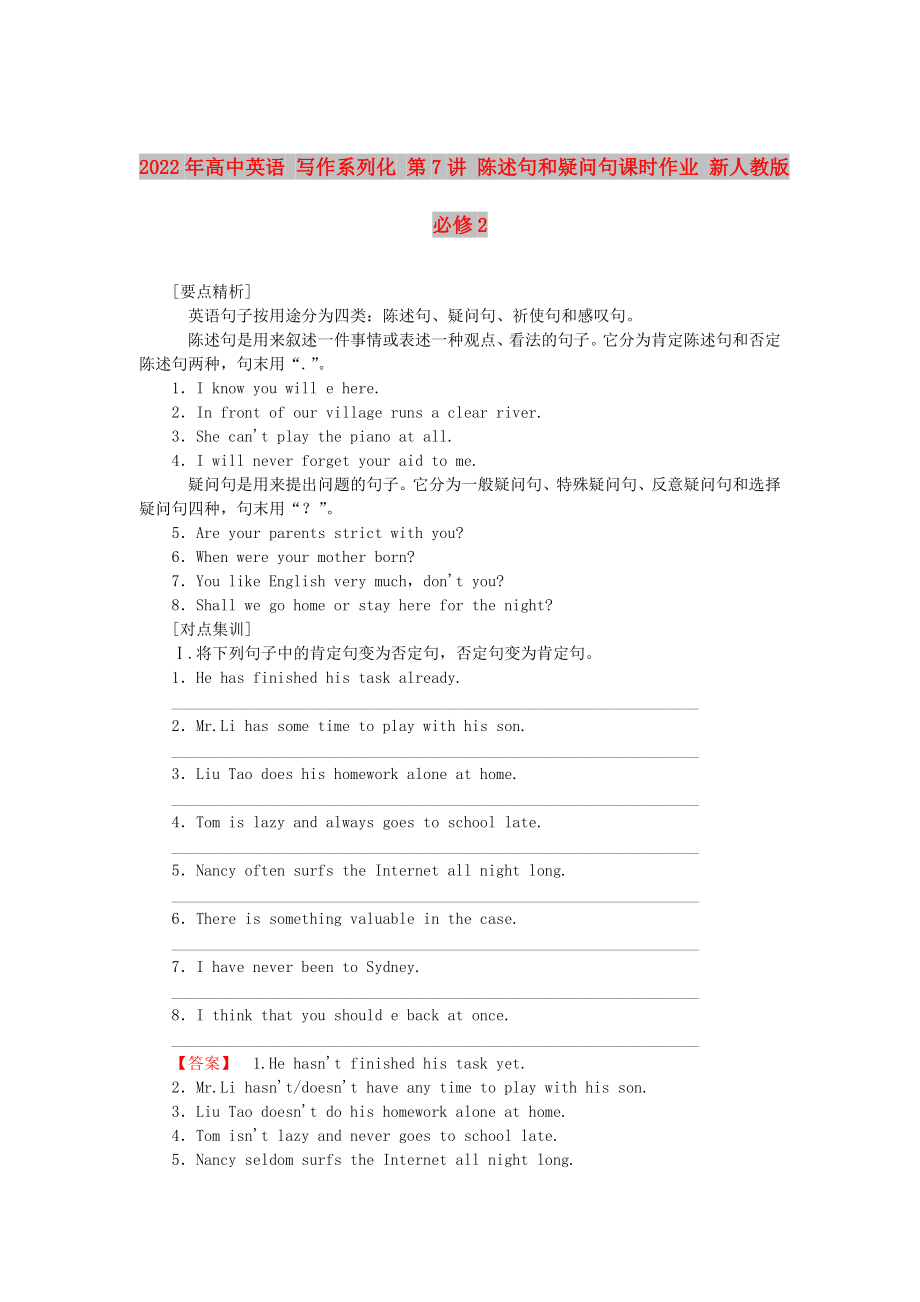《2022年高中英語(yǔ) 寫(xiě)作系列化 第7講 陳述句和疑問(wèn)句課時(shí)作業(yè) 新人教版必修2》由會(huì)員分享��,可在線閱讀��,更多相關(guān)《2022年高中英語(yǔ) 寫(xiě)作系列化 第7講 陳述句和疑問(wèn)句課時(shí)作業(yè) 新人教版必修2(2頁(yè)珍藏版)》請(qǐng)?jiān)谘b配圖網(wǎng)上搜索���。
1、2022年高中英語(yǔ) 寫(xiě)作系列化 第7講 陳述句和疑問(wèn)句課時(shí)作業(yè) 新人教版必修2
[要點(diǎn)精析]
英語(yǔ)句子按用途分為四類:陳述句��、疑問(wèn)句�、祈使句和感嘆句。
陳述句是用來(lái)敘述一件事情或表述一種觀點(diǎn)��、看法的句子���。它分為肯定陳述句和否定陳述句兩種����,句末用“.”����。
1.I know you will e here.
2.In front of our village runs a clear river.
3.She can't play the piano at all.
4.I will never forget your aid to me.
疑問(wèn)句是用來(lái)提出問(wèn)題的句子���。它分為
2、一般疑問(wèn)句���、特殊疑問(wèn)句、反意疑問(wèn)句和選擇疑問(wèn)句四種�,句末用“?”�。
5.Are your parents strict with you?
6.When were your mother born?
7.You like English very much,don't you?
8.Shall we go home or stay here for the night?
[對(duì)點(diǎn)集訓(xùn)]
Ⅰ.將下列句子中的肯定句變?yōu)榉穸ň?����,否定句變?yōu)榭隙ň洹?
1.He has finished his task already.
__________________________________
3�、_______________________________
2.Mr.Li has some time to play with his son.
_________________________________________________________________
3.Liu Tao does his homework alone at home.
_________________________________________________________________
4.Tom is lazy and always goes to school late
4、.
_________________________________________________________________
5.Nancy often surfs the Internet all night long.
_________________________________________________________________
6.There is something valuable in the case.
_________________________________________________________________
7.
5�����、I have never been to Sydney.
_________________________________________________________________
8.I think that you should e back at once.
_________________________________________________________________
【答案】 1.He hasn't finished his task yet.
2.Mr.Li hasn't/doesn't have any time to play with hi
6���、s son.
3.Liu Tao doesn't do his homework alone at home.
4.Tom isn't lazy and never goes to school late.
5.Nancy seldom surfs the Internet all night long.
6.There is not anything/nothing valuable in the case.
7.I have ever been to Sydney.
8.I don't think that you should e back at once.
Ⅱ.按要求完
7�����、成下列句子��。
1.Jack usually has some noodles and bread for breakfast.(改為一般疑問(wèn)句并做出肯定和否定回答)
_________________________________________________________________
2.They have lived here for_more_than_ten_years.(對(duì)劃線部分提問(wèn))
_________________________________________________________________
3.There will be a sport
8���、s meeting at the end of this month�����,______________�����?(完成反意疑問(wèn))
4.This magazine es out every_other_week.(對(duì)劃線部分提問(wèn))
_________________________________________________________________
5. They could hardly believe his words�,________________�����?(完成反意疑問(wèn))
6.Tom is going to be a scientist.(用an engineer改為選擇疑問(wèn)句)
9����、_________________________________________________________________
7.The Diaoyu Islands belong to China,________________��?
The Diaoyu Islands don't belong to China,________________��?(完成以上兩個(gè)反意疑問(wèn)句并均根據(jù)實(shí)際情況做出回答)
_________________________________________________________________
8. _bought_an_ with in_
10�����、the_bookshop_ .(對(duì)劃線部分分別進(jìn)行提問(wèn))
_________________________________________________________________
【答案】 1.—Does Jack usually have any noodles and bread for breakfast?
—Yes����,he does./—No�����,he doesn't.
2.How long have they lived here?
3.won't there
4.How often does this magazine e out?
5.could they
11����、
6.Is Tom going to be a scientist or engineer?/What is Tom going to be���,a scientist or an engineer?
7.don't they�;Yes�����,they do./do they;Yes�,they do.
8.①Who bought an English dictionary with Li Hua in the bookshop near their school on Saturday?
②What dictionary did Li Ping buy with Li Hua in the boo
12、kshop near their school on Saturday?
③What did Li Ping buy with Li Hua in the bookshop near their school on Saturday?
④What did Li Ping do with Li Hua in the bookshop near their school on Saturday?
⑤Who/Whom did Li Ping buy an English dictionary with in the bookshop near their school on Saturday?
⑥In which bookshop did Li Ping buy an English dictionary with Li Hua on Saturday?
⑦Where did Li Ping buy an English dictionary with Li Hua on Saturday?
⑧When did Li Ping buy an English dictionary with Li Hua in the bookshop near their school?
 2022年高中英語(yǔ) 寫(xiě)作系列化 第7講 陳述句和疑問(wèn)句課時(shí)作業(yè) 新人教版必修2
2022年高中英語(yǔ) 寫(xiě)作系列化 第7講 陳述句和疑問(wèn)句課時(shí)作業(yè) 新人教版必修2

